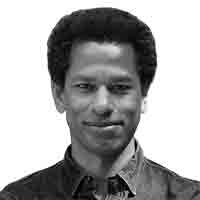What is a Black film? What elements make a Black film? The answer is nearly impossible to nail down. It’s easy to say Selma or 12 Years a Slave or Do the Right Thing are Black films—they’ve got Black directors, Black actors in lead roles, and stories told from a Black perspective. But what about a film with a Black director that has nothing to do with Black culture, like Steve McQueen’s Shame? Is that a Black film? Maybe. What about a film with a Black-focused story and a white director, like The Color Purple by Steven Spielberg or Quentin Tarantino’s Jackie Brown, which borrows deeply from a Black film aesthetic: the blaxploitation genre. Are those Black films? Is it not strange to think a white artist could create Black art? Perhaps the question is unanswerable. Film is, after all, such a collaborative medium, requiring so many people working together. Perhaps the question is too simplistic in our modern, messy, pluralistic culture. But still, as tricky as it is to define, I feel that I need films I perceive as Black almost as much as I need air.
I need to see stories about Black people. I need to see Black directors, actors and writers at work largely because I need art that reflects a Black point of view. Culture is one important part of shaping how we view the world, and I need to see the world from my perspective, because having a white-centric perspective is neither healthy nor productive for me. I am overrun with white-centric art that posits white people as the center of the world. Whenever I can find a film that’s built around a Black perspective—a Black way of looking at the world—I feel fulfilled and affirmed, and I feel like my point of view on the world truly matters.
Kathryn Bigelow’s Detroit is all set up to be a Black film. It’s set in the D and several Black characters are at the heart of the script. Detroit tells the true story of how, in the midst of a multi-day riot, several white police officers raided the Algiers Motel on July 25, 1967, and terrorized several young Black people who were there, killing three of them. The film’s central scene is the 45 minutes inside the Algiers, when cops have Black youths up against a wall. You’re left wondering which of them is going to die and it feels like a real-life horror film. Blacks are trapped by white officers whose craven evil or pluralistic ignorance makes them a threat to kill anyone at any second—like a deranged horror villain. This, of course, is not unlike the way many Black people experience the police: we don’t need to imagine Jason or Freddie when there are men prowling our community with guns, the legal right to use them, and a sense that they can do whatever they want to us. Black people have every right to be scared of them.
ADVERTISEMENT
Detroit would easily qualify as a Black film were it not for the complicating factor that Bigelow is a white woman. But putting that aside, the film does so much of the work that I hope for from a Black film. It has sympathy for its Black characters. They’re in the midst of a citywide riot, the police are girding for battle, and the film posits the uprising as understandable given the conditions of the Black community at the time. The white officers in the movie tend to be evil and angry or incompetent followers, standing in stark contrast to John Boyega’s Black security guard, who’s disarming and intelligently stealthy in his approach to the white officers, allowing him to slide into the hotel and work both sides, quietly helping some of the Black victims. The horror scene inside the Algiers is written from the point of view of the terrorized, underlining how Detroit is a film that has deep respect for its Black characters and the hardships they endure.
So many films about Black history present their stories through the lens of a white protagonist (The Help, Mississippi Burning), so the story is ultimately about whites learning how bad it is for Blacks—thereby leaving Blacks as props in the white racial education process. And when you walk out of a movie like that, you feel like a prop. That’s the essence of white centrism: we exist as pawns in their play. Detroit will have none of that. The Black point of view is privileged. My worldview is affirmed. My perspective is central. It feels empowering to have my perspective affirmed no matter what race the director is.
It’s far too easy for people who aren’t white to fall into a white-centric mindset—obsessing over how white people will respond to something, thinking of whiteness as normative. Culture trains us to see the world in a white-centric way, but films like Detroit help address that. Even better is a film like Quentin Tarantino’s Django Unchained. At the core of the film is Jamie Foxx’s Django, and his rejection of the colonized mind. From the very moment he’s freed near the beginning of the film, he changes his body language, his tone, and his mindset. It’s as if we see him conquer the colonized mind and spend the rest of the film empowered by that.
This is the sort of empowerment that films built on a Black perspective can have. Even a film like Detroit—centered on a moment from hell and the real story of the harrowing death of several young Black people—can make you feel more powerful because the film privileges the Black perspective and is unflinching about our reality. We can face the pain and horror together.





